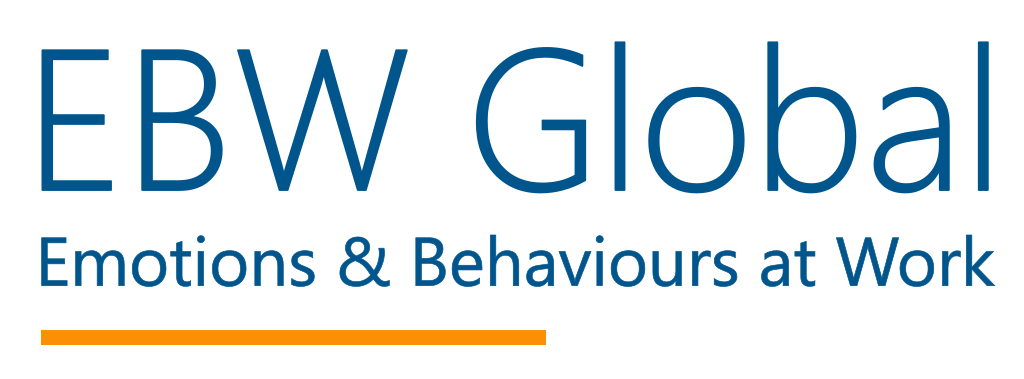
Who We Are
WHAT WE DO
We are the Business Emotional Intelligence experts. We are on a mission to improve lives by changing how people work together.
We are EBW Global
We are the Business Emotional Intelligence experts. We train you to use Business Emotional Intelligence psychometric assessments, tools and programmes to help organisations improve the performance of their people.
Our Business Emotional Intelligence assessments, tools and programmes enable you to get the best out of your people and make the best data-driven decisions where ever you or your candidates are in the world.
Our Psychologists have over 25 years of global experience and expertise in assessment design, human capital management, diversity and equal opportunities that ensures you get the best assessment training and the most innovative tools.
With a partners' network based on 6 continents, all of whom are certified to use the EBW Global assessments and tools, we guarantee the EBW Global Business Emotional Intelligence approach empowers leaders and teams to transform themselves and their organisations.
Research has shown that emotional intelligence is one of the strongest predictors of performance, with around 90% of top performers exhibiting high levels of emotional intelligence.
World Economic Forum
What are our Vision & Goals?
Improve Working Lives
We believe that our work should always improve people’s lives by changing how leaders and teams work together. Organisations and businesses that actively create and support self-awareness and develop Business Emotional intelligence in their people do better.
Business Emotional intelligence is rooted in positive psychology and understanding how we operate as humans is vital - the majority of our time is spent at work after all.
We have seen it again and again in our work at EBW Global - changing how people understand themselves and others at work transforms their lives.
Universities & Research
At the heart of our vision is that our assessments tools and programmes are always informed by the latest research and science. We collaborate with universities and researchers on a continual basis to ensure that our work remains the best in the field of corporate Emotional Intelligence.
Our psychologists have taught and provide lectures at universities in their own research fields. Through our research programmes EBW Global offers supervision, and free assessments for MSc and PhD research.
Our work with universities and researcher means that our suite of assessments, tools and programmes are always improving in line with the latest evidence & continue to be excellent predictors of workplace and job success.
Diversity & Inclusion
Our vision is underpinned by the belief that society is better when people are comfortable with diversity and are inclusive.
Our approach is to work with organisations to help them implement practices that:
Remove barriers, real or perceived, in selection and promotion & allow for the development and maintenance of an inclusive working environment.
Embed diversity and equal opportunities at all levels and in all aspects of an organisation.
Enable staff to experience a consistently inclusive and supportive environment to assist them in reaching their full potential.
EBW Global’s Story
The EBW (Emotions and Behaviour at Work) came about in 1997 when Stephen Walker and Dr Neil Scott (author of 'This book has feelings') were asked to design a series of assessment centres with a focus on Emotional Intelligence for the MBA programme at Warwick University - they put their ideas into action and EBW was born!
Over the last 20 years the EBW assessments, toolkits and programmes have continued to be developed by a team of psychologists and experts whilst being underpinned by rigorous research into diversity inclusivity and fairness - improving lives by changing how leaders and teams work together.
The EBW Psychometric model was created by Dr Neil Scott and Stephen Walker in 1997. Throughout the 2000s many new language versions were added and validated, including Arabic, Chinese and Korean, ensuring the EBW worked cross culturally.
Two new sub scales were added in 2013 along with a new impression management tool. In 2019 a review of the team assessment resulted in a new team toolkit being added to the platform. Each year the EBW is used in research projects and our knowledge library continues to be developed with new tools and programmes.
The EBW Story would not be complete without recognising that we have had many psychologists, experts and trusted EBW Global Partners who have contributed to make it into the innovative tool it is today and who provide regular feedback about how EBW impacts the lives of real people.
Origins of the Business EQ Assessment
EBW is a unique global assessment and development tool for Consultants, Coaches, HR & L&D Experts and Psychologists.
Based on over 20 years of worldwide use and research, it enables you to get leaders and teams to understand why they behave the way they do and to use a highly effective developmental framework to improve their occupational performance.
The EBW assessment was developed in 1997 by a team of Occupational Psychologists led by Dr Neil Scott (a psychometric expert and author of numerous articles and papers on fairness in assessment) to improve business performance.
It has a proven track record and is available in multi-languages (including: Chinese, Korean, Arabic). It is used worldwide through a network of distributors and partners and with a variety of organisations and individuals (such as American Express, HSBC, Disney, British Airways, The Home Office, NHS).
-
EBW Assessments have their origins in both rational and empirical studies of emotions and behaviours at work. Developed on the basis of research dating back to the 1990s, it seeks to bring together theoretical and research based understanding of the way emotions and behaviours impact on effectiveness at work and to provide a means of applying these when identifying and developing individuals and teams.
Traditionally emotions and behaviours have not been measured together with intelligence. Assessments have concentrated on either Intelligence (IQ) type or personality assessments. Both models have tried to explore how behaviour can affect success. Neither of these models addressed in detail how emotions and self-awareness can impact on an individual's success. Emotional Intelligence theories and questionnaires have attempted to address this by combining concepts of linear intelligence (more is better), with personality type constructs and emphasising the importance of understanding emotions and developing self-awareness. This has meant that there is considerable overlap between Personality and Emotional Intelligence models of behaviour.
-
The fundamental difference between most 'Personality Questionnaires' (PQs) and 'Emotional Intelligence Questionnaires' (EIQs) is that, whilst there is often a good deal of overlap in the domains they measure, the value systems that underlie these domains differ. Most personality models state that there is no 'right' or 'wrong' place to be on a scale, that all personalities are equally valid. Therefore, whilst being highly 'extravert' is helpful in some job roles, there are also negative aspects to this position and there are broadly equally weighted costs and benefits to both 'extraversion' and 'introversion'. Other roles may demand 'Introverts' rather than 'Extraverts' although there will again be costs associated with selecting Introverts.
This contention has been undermined to some extent by meta-analytic research into personality that suggests, for example, that higher conscientiousness scores are generally predictive of better job performance across a wide range of jobs (Ones, Viswesvaran & Schmidt, 1993). However, this does not exclude the possibility that there are some jobs for which high conscientiousness may have some costs.
The position taken by much of the literature on Emotional Intelligence (typified by Goleman 1996 & 1998) differs fundamentally from the PQ approach in that Emotional Intelligences are likened to competencies, that can be developed and that, therefore, the more you have the better. To clarify, the literature has been consistent in demonstrating the higher your cognitive intelligence, the better your job performance (e.g. Schmidt & Hunter 1998, Salgado & Anderson 2001) and that people with lower intelligence are therefore less desirable and at a competitive disadvantage when seeking employment. The Emotional Intelligence (EI) position will be broadly the same, if you do not behave conscientiously then you will be broadly less effective. The personality approach says that those who have a less conscientious personality and attitudes (and therefore behaviours) may be less effective in many ways but more effective in others (e.g. they may be better at dealing with ambiguity, coping with situations that are hard to structure or with the unexpected).
-
The development of the EBW model was initiated to some extent by this apparent conflict between the two models of behaviour. Whilst Personality and Emotional Intelligence are, theoretically, different constructs, there is a great deal of overlap in the behaviours they measure. Personality is thought of as patterns of consistency in an individual's behaviour across a range of situations. Whereas EI is a set of emotionally based behaviours that enable people to be more effective. Most EI researchers would consider that by raising an individual's self awareness and with the right training these emotionally based behaviours can be developed to make an individual successful in the workplace. In the applied context most organisations will not be as concerned about whether they are measuring conscientiousness as a Personality or Emotional Intelligence dimension as they will be about whether they are measuring behaviours that are relevant to the roles they are seeking to fill or develop.
-
The origins of the EBW model lie in research into attitudes, emotions and behaviours as predictors of job performance carried out over a number of years. Certain clusters of emotional behaviours emerged consistently as effective predictors of job effectiveness across a range of roles. Still, other clusters showed no consistency in their relation to job effectiveness but were clearly meaningful behavioural constructs. For example, some scales, such as Empathy, were often found to be zero to negative predictors of many jobs, conflicting with the EI literature.
The EBW assessments were developed based on the predictive clusters of emotional driven behaviours but supplementing them with other questions to broaden out the scales, and with other scales suggested by the Emotional Intelligence and personality literature. These were trialled in a large public sector organisation, in a university and given to a diverse occupational sample to confirm the internal structure of the assessment tools, and the EBW scales emerged as a result.
The core items in some of these scales have been found to be predictive of success across a wide range of roles, most notably the Conscientiousness, Decisive and Motivation Scales. However, we are reluctant to suggest that they are generally predictive of every and all jobs imaginable as it is more important to match the needs of the job to areas covered by the scales than rely on empirical research carried out for different jobs. Other scales have not been found to be empirically predictive (e.g. Empathy) and this may be because the relationship with the job is not purely linear (e.g. it may be possible to be either too empathetic or to be insufficiently empathetic, middle positions on the scale being ideal) or because different levels suit different jobs. Some scales are based on more theoretical work and do not have the core of predictive items that have been proven empirically over the years (such as: Adaptability) but these, like Empathy, remain important work-based areas that should be explored.
The EBW assessments are based around a core of highly predictive questions across a range of jobs but have been supplemented with other questions to ensure scales are measuring in sufficient breadth to cover the range of tasks and functions. According to EI theory, the higher a person scores on each of these scales the more effective they will be, but we would emphasise that there are strengths and weaknesses associated with every score you can obtain. When using the EBW Business Emotional Intelligence models and assessments one should consider the scale descriptions and how they relate to the role rather than operating on the simplistic basis that high scores on scales are, per se, a positive thing.
Learn with our Latest Articles

How Can We Help You?
Let us help you grow your business - contact us to start your journey, find out more about becoming a Partner to use EBW assessments and tools, or find an EBW Certified Partner to work with.










Leadership in 2025 isn’t about innovation or progress—it’s about survival. Economic instability, workforce disengagement, and AI disruption are hitting hard, and too many leaders are stumbling over the same old pitfalls. In a nutshell, these are the five critical challenges leaders are facing (and often failing to address)
Those who fail to step up will soon find themselves irrelevant in a landscape that no longer tolerates outdated leadership.